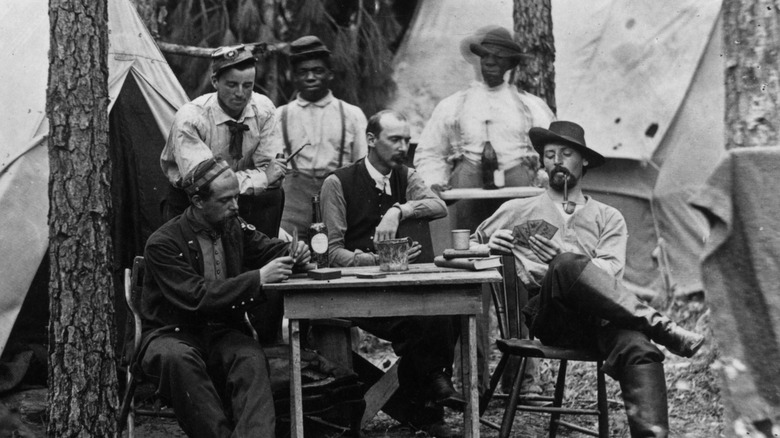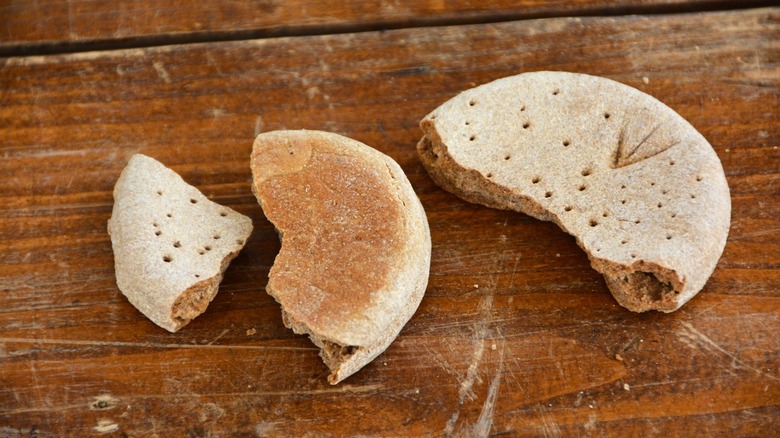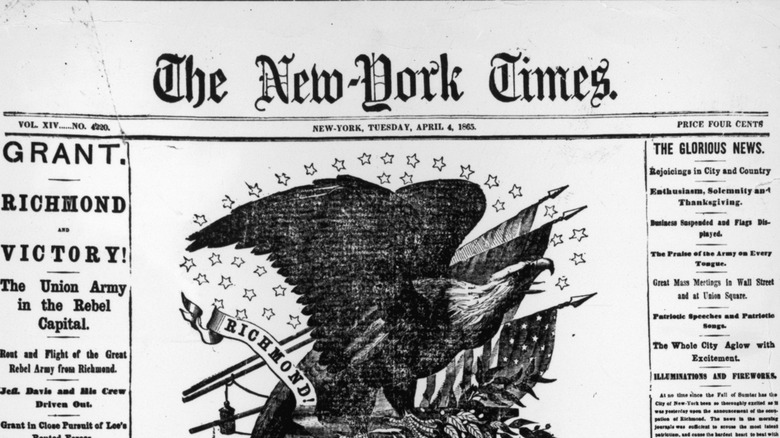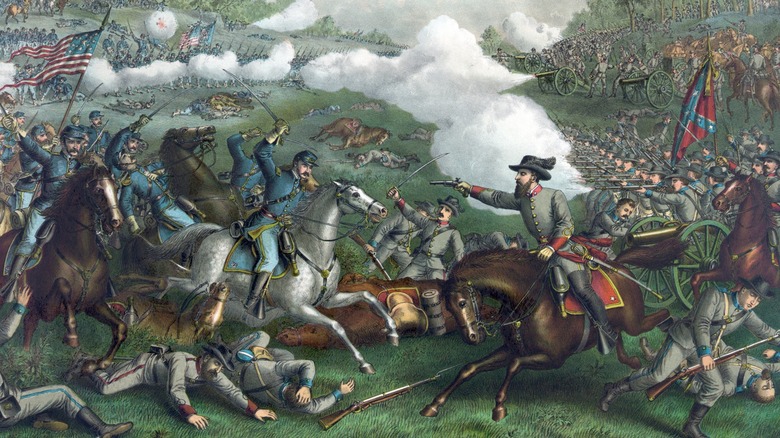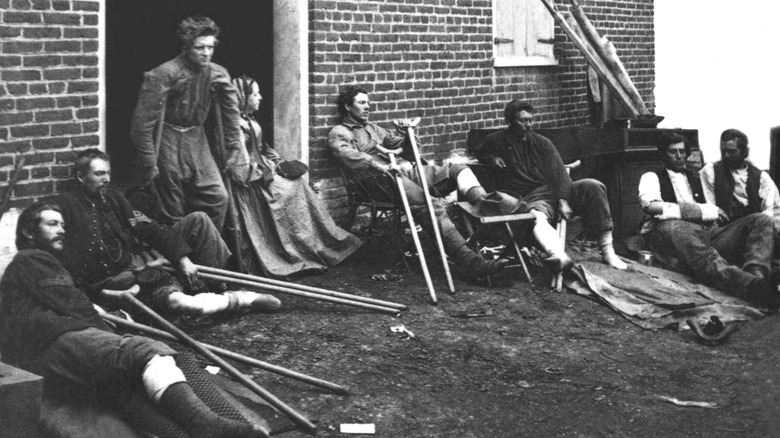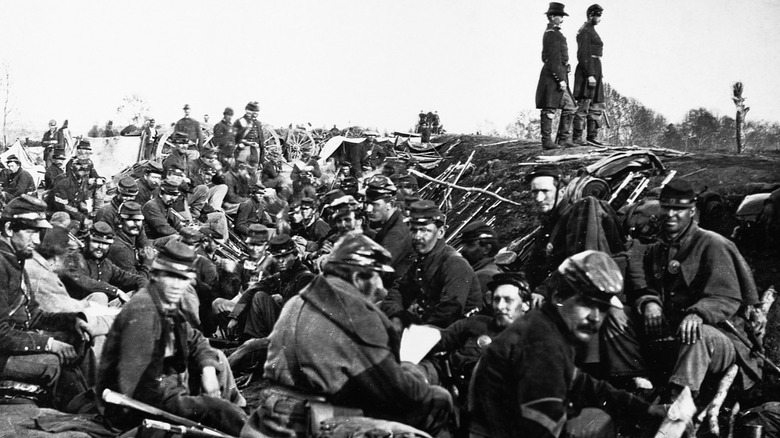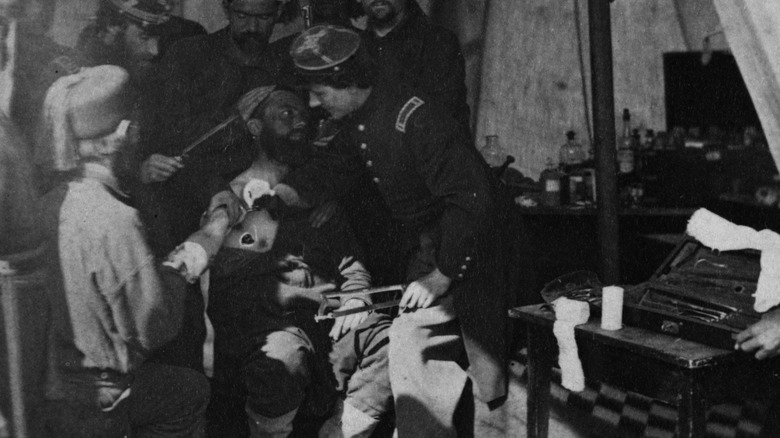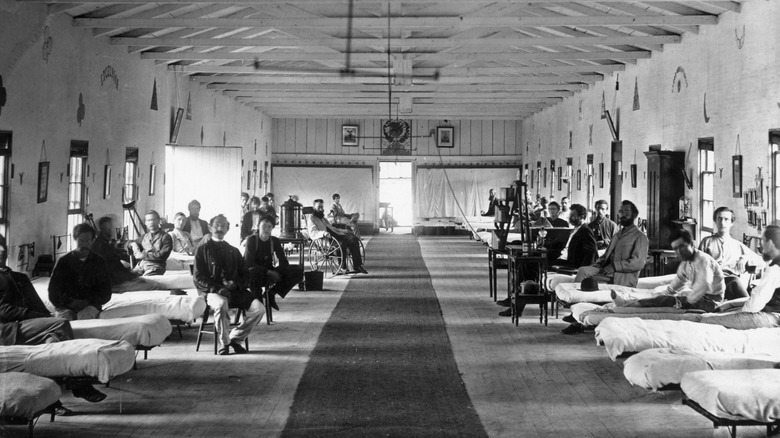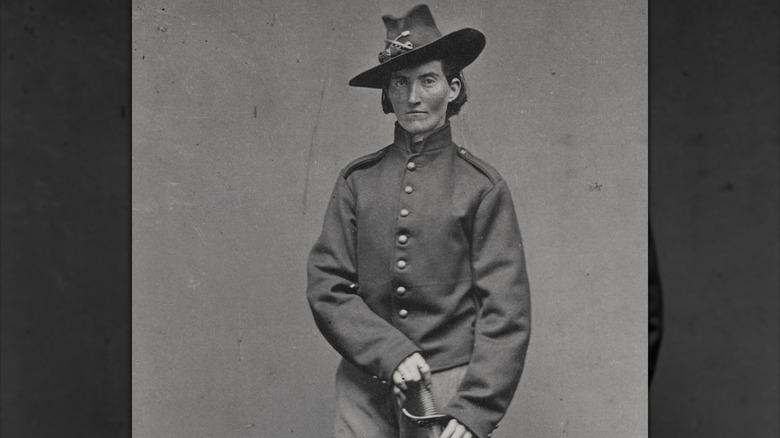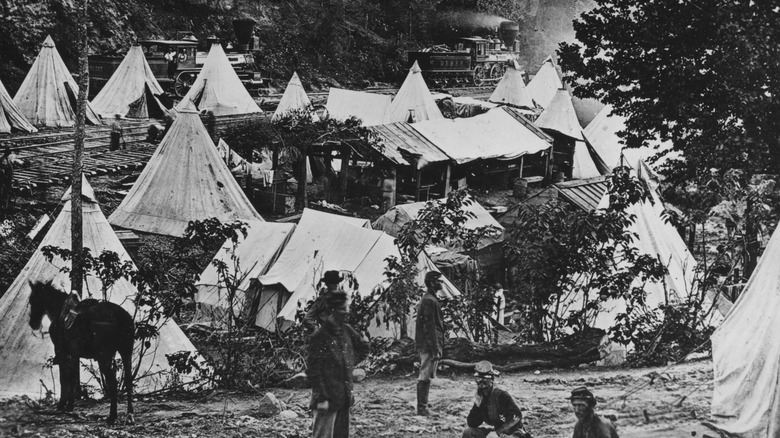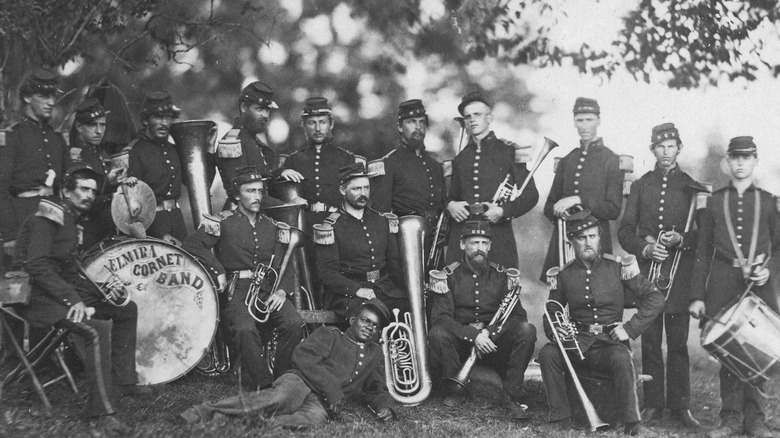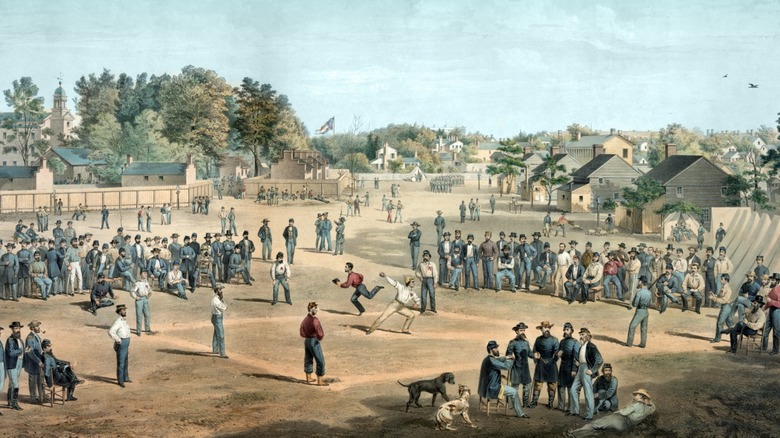What Life Was Really Like For Civil War Soldiers
The life of a Civil War soldier was far from glamorous. More than three million men participated, including both the Union and the Confederacy, with more than a million becoming casualties. It was by far America's bloodiest and most costly war in terms of human loss, and historians estimate that more Americans died during the Civil War than both World Wars combined.
War recruits came from practically all walks of life, and there was hardly such a thing as the "average" Civil War soldier among them. By far, the majority of combatants were previously farmers, but there were also mechanics, laborers, and even those who worked in professional occupations who fought in the war. Most soldiers were white, but there were also more than 175,000 Black Union soldiers, and all of them, regardless of color, had to adapt to the realities of living and fighting in a warzone.
During the course of the war, troops had to put up with a lot, and that was before counting the mass amounts of bloodshed they witnessed on the battlefield. The Civil War soldier's life consisted of bad food, a longing for companionship, and atrocious medical care, and that's just the tip of the iceberg. Yet, they also were able to engage in sport, write letters to loved ones, and even listen to music. Things were far from easy, and at times became very trying, but this is what life was really like for Civil War soldiers.
Not the best cuisine
The diet of a Civil War soldier was hardly ideal and pretty unappealing. Soldiers received one of two kinds of rations: camp rations or marching rations. Marching rations were larger, but both usually consisted of around a pound of either saltpeter or fresh meat, along with bread, beans, rice, sugar, vegetables, and coffee.
If you were a commissioned officer, you also had access to the extra goods in the Brigade Commissary that normal soldiers didn't. Hardtack (pictured above) was plentiful but unappetizing, as it was a dry biscuit that consisted of only flour and water. They were very hard to eat, sometimes to the point that you had to break them apart by hand before chewing them. Oftentimes, their bread or hardtack was infested with maggots or weevils, which they sometimes ate anyway. Coffee was a precious commodity, but one had to learn how to properly secure it for marches, and green recruits often found their coffee rations wasted from improper storage.
Soldiers generally preferred to cook their own raw beef rather than have the company cooks do it, and the meat was supposed to be rotated by cut to the men. The most reviled meat was by far the saltpeter beef, nicknamed "salt horse," which most men refused to eat. Generally, soldiers got salt pork for meat, sometimes of questionable quality, but they learned to make do. They also got an occasional ration of whiskey, though it usually wasn't much and hardly made up for the other deficiencies.
Correspondence ads
Serving during the Civil War could get quite lonely for many of the troops in the Army. Far away from home and cut off from friends and family, many soldiers found themselves wanting companionship, often from the opposite sex. Obviously, this was back in the 1860s, well before the days of texting, email, or social media, so soldiers had to get creative in their search for a potential pen pal.
In her book "Busy Hands: Images of the Family in the Northern Civil War Effort," Patricia Richard describes the various correspondence ads that some troops would put in local newspapers seeking relationships. Soldiers would often describe their physical features hoping to attract a response, and there was a good deal of humor, too. Though a minority of the Union army participated, within just a few months, editors could be inundated with sometimes hundreds of ads from soldiers looking for everything from matrimony to fun. Many of the ads were humble and suggested strong middle-class values, like good education, civility, and a solid character.
After responding to an ad, the prospective couple would usually exchange "calling cards" and begin regular correspondence. Eventually, they might move forward towards dating and eventually courtship, but that was far from guaranteed. In addition to love letters, soldiers also communicated with their family and friends back home. It wasn't quite Facebook or YouTube, but it almost feels like a type of social media, just a 19th-century version.
You had to act tough
No matter which side they fought for or what theater of action they took part in, most Civil War soldiers came face to face with some of the most hellacious experiences possible while in battle. Death constantly surrounded them, and in some cases 30,000-50,000 men would perish in a single battle.
Yet, even under the most trying of circumstances, a soldier couldn't show that the bloodshed and destruction affected them. Soldiers equated the idea of being afraid with weakness, and they were expected to always show courage no matter what. Many soldiers felt that the height of bravery was for an officer to act as if they were unaffected by incoming enemy fire, steadfastly leading their men as hot lead chewed up the earth around them. At first, even ducking, walking fast, or trying to find cover from enemy fire while marching into battle was strictly forbidden, and wearing armor would only earn you a round of teasing from your compatriots. Soldiers were convinced that this was what it meant to be a man fighting in battle, and officers had to prove their worth to be respected.
Even if you found yourself wounded, you were supposed to act like nothing was wrong and calmly walk from battle to the aid tent, and showing pain was associated with weakness. Some men actually found wounds alluring, thinking it would prove how courageous they were and potentially even help secure a mate. It was certainly a different time.
Poor medical care
For soldiers who became wounded fighting in the Civil War, their experience with the medical system was often pretty poor. While there were some bright spots, like the invention of a trained ambulance corps to carry the wounded off the battlefield, they were largely overshadowed by the horror that was the actual field hospital. Additionally, the rudimentary nature of the ambulance system still meant some soldiers would lay in agony on the battlefield for days before getting transport, while their wounds became infected or worse.
At the field hospitals, doctors and surgeons had reputations for being drunk and lacking medical knowledge, and countless soldiers thought it better to just avoid them altogether. If you did find yourself with a serious wound, your prospects for a full recovery were not great. Being gut-shot was basically a death sentence due to infection, and heaps of men found their wounds full of vermin or maggots that often had to be plucked out by hand. Outside of amputation tents there would be piles of severed arms and legs, radiating their germs and sickness everywhere. The hospitals were seemingly always filled with men screaming in agony, and amputation was extremely common.
For pain management, soldiers were given laudanum and morphine, two serious narcotics, saddling some soldiers with addiction issues well after the war ended. It's a sad commentary when the medical tent can be as scary as the battlefield, but such was the state of 1860s medical knowledge.
If you or anyone you know needs help with addiction issues, help is available. Visit the Substance Abuse and Mental Health Services Administration website or contact SAMHSA's National Helpline at 1-800-662-HELP (4357).
Life in the trenches
While not all soldiers experienced the terrors of life in the trenches during the Civil War, for those who did (and survived) it was an unforgettable experience. The use of trenches began in early-1862 in Virginia, and they played a prominent role in protecting the Confederate defenders during the month-and-a-half-long Siege of Vicksburg the following Summer. Usually, it was Confederates in the trenches while the Union attacked them from the outside, to varying degrees of success.
Actually living inside the trenches was abominable, and things often got worse the longer the siege lasted and they couldn't escape. Necessary supplies like ammunition, food, and potable water would run low, or out completely, and the constant pounding of artillery could be stressful and give the men headaches. The elements, like extreme heat, cold, snow, and rain, only made things worse, and some men opted to risk the Union sharpshooters and sleep outside the trenches because they were so bad.
Everything was dirty, there was vermin, you couldn't stand up and stretch, and the rain would turn the trenches into sloppy mud pits. There were some lighter moments, such as when the men invited women into the trenches to visit them during a ceasefire, but that was far from common. By the end of the war, some men started to prefer the trenches to the dangers of open warfare, but those feelings usually left fairly quickly as the malaise of trench life sank in.
Many faked injuries or sickness
For most, fighting in combat during the Civil War was an absolutely frightening prospect, and not surprisingly, some men took things into their own hands to avoid having to actually go into battle. Since running in fear was unacceptable and could wind up getting you shot by your own commander, some soldiers turned to faking injuries or sickness, or even worse, intentionally injuring themselves so they could avoid having to fight.
Yet, to be caught giving yourself a war wound could end up having far worse consequences than intended. If nurses and doctors treating you at the field hospital had an inclination that you may have shot yourself, some of them would amputate much more of the limb than necessary — like taking off your entire lower leg for a foot wound. Soldiers also tried to fake all kinds of illnesses and maladies, like chronic rheumatism, heart disease, epilepsy, and tuberculosis, and others tried to sell their injuries as being worse than they really were. In one case, a soldier apparently shoved a turkey heart into his rectum to simulate hemorrhoids, but he was caught, and others would swallow tobacco juice to induce vomiting.
Like with wounds, if nurses or doctors suspected you of fakery they could sometimes retaliate, including giving unnecessary and uncomfortable treatments. Those faking or giving themselves wounds were definitely the minority of soldiers and considered cowards, but at least a few of them managed to rank high on the creativity scale.
Disease and sickness were rampant
Many of the men who died during the Civil War succumbed to wounds not inflicted on the battlefield, but instead perished due to various illnesses and diseases. For the Union, more than double died from diseases compared to being killed while fighting, and more than 60% of the Confederacy's deaths were from disease, too.
According to Gerald Linderman in "Embattled Courage: The Experience of Combat in the American Civil War," both armies consisted of recruits from urban and rural areas, and the urban recruits had an advantage over the rural ones who grew up in the country: immunity. Many rural recruits experienced childhood illnesses like measles and mumps when they began interacting with so many new people, which their urban counterparts had already experienced growing up in more dense neighborhoods. In addition, soldiers also faced a gamut of other diseases, including cholera, smallpox, and tuberculosis, and the vast majority of soldiers had to deal with dysentery at some point.
Ironically, hospitals were often places where diseases would spread. Not only did parasites like lice and fleas run wild and spread infection, but only Union soldiers had wide access to Quinine, leaving Southerners much more vulnerable to horrific bouts of malaria. Surgeons actually used bags of dirt to absorb the blood from wounds, which was hardly sterile or cleansing. Obviously, everyone was doing the best with what they could, but looking back 160 years later paints quite a rough picture.
Many women fought alongside men
The vast majority of soldiers fighting in both the Union and Confederate armies were male, but that didn't stop roughly 750 women from also fighting in the war, too. At the time, women were officially prohibited from serving in the war outside of a medical capacity as doctors or nurses. However, hundreds of women, in both the North and the South, decided to shun those ideas and fought gallantly for their side.
Life was certainly not easy for women in the army, who lived in constant fear of exposure. Some of them, like Frances Clayton (pictured above), actually served alongside their husbands, and in some cases came upon their dead bodies on the field. They had to hide their feminine features, like their breasts, which wasn't easy considering the close quarters soldiers lived in. Luckily, most of the time they were not subjected to violence when discovered, though a few may have faced time in military prison. Some women even became commissioned officers in the Union Army in disguise.
Since they were pretending to be men, the women soldiers had to do all of the same jobs and physical exercises without showing any difficulty. It often wasn't until they were dead or injured that their true sex was finally revealed, likely shocking many of their compatriots. Still, a bullet shot by a female soldier does just as much damage as from a male, and many of them were likely deadly forces to be reckoned with.
Tent life
In many ways, there were two seasons for soldiers: marching and fighting season in the warmer months, and the winter season when it got cold and fighting halted. Typically, soldiers' encampments depended upon the weather. In the winter, soldiers had to contend with the elements, including freezing temperatures and snow but often got to stay in more permanent encampments that sometimes included log cabins. Their winter huts were heated with stovepipes, and they used natural sources like mud and leaves to help with insulation. Many of the camps almost turned into small cities, complete with shops, houses of worship, and even streets to travel down. Unfortunately, they were also breeding grounds for disease, leading to much death and sickness.
During the Summer marching and fighting months, their accommodations were more often lightweight tents that could be easily packed up and carried. Some soldiers stayed in what were called Sibley tents, named after their inventor, which was a circle tent that could hold around 12 soldiers but would get very stuffy. Another tent was the A tent, which housed four men comfortably or five to six if they were spooning closely.
Hospital tents were a different story, as they had actual standing walls and came in various sizes. Some could even be heated when it was cold out. Life was probably far from pleasant living in such rank conditions, but soldiers couldn't be picky, and what's more, they still had a war to worry about fighting, too.
Most of your time was not spent fighting
For your average soldier, actually engaging in combat was not done all that frequently. In the areas that got cold in the Winter, soldiers stopped fighting and settled down in camp, and in the fighting months, they fought about once per month. The rest of their time was spent either marching, drilling, or in a temporary camp.
On an average day, soldiers would wake up at the crack of dawn to begin their first roll call and eat, which was soon followed by some sort of drilling or marching. While at camp, some committed crimes against their fellow soldiers, like stealing from them, and others were insubordinate towards their officers, which could lead to severe punishment. However, soldiers also engaged in leisure activities like writing, playing cards, and gambling. Incredibly, pets were actually a frequent sight around camp, even dogs and cats, and troops could attend religious services with a chaplain if they wanted.
Often, music could be heard coming from the soldiers at the camps. This was the days before recorded music and mobile speakers, so if soldiers wanted rhythm they had to create it themselves, and they definitely did. In addition to marching music and taps from the army bands, soldiers had their own instruments and made music with guitars, banjos, and more. Civil War camps could be a lively scene and a way to unwind from the horror of the battlefield — something most soldiers desperately needed.
Soldiers played baseball a lot
While soldiers were at camp, they often played games during their downtime. This included cards, horseshoes, boxing, and even a primitive form of football. Yet, of particular note was baseball, which became one of the most popular games among the men. Baseball had been invented a few decades prior to the outbreak of the war and had some notoriety among Northerners, but, weirdly, the Civil War is part of the reason it turned into a national sensation in the years after.
When the fighting started, Northern troops would play against each other, even when they became prisoners, which is how it spread to the Confederates. Confederates saw the Union POWs playing, and many of them took it up themselves, and sometimes a battle would erupt while soldiers were playing and throw everything into chaos. Nevertheless, after the war, Confederates brought the game home, and everyone was playing in no time.
Two of the most notable Civil War baseball games are the famous late-1862 game at the Salisbury Confederate Prison in North Carolina among Union captives, and the Christmas Day game also in 1862 in South Carolina among New York Union regiments. Supposedly, A.G. Mills — the future president of MLB's National League — fought at the Christmas game, which may have been witnessed by 40,000 people. It was obviously a different sport back then, with underhand throwing, but the spirit of baseball was very real and still lives on for many Americans today.
